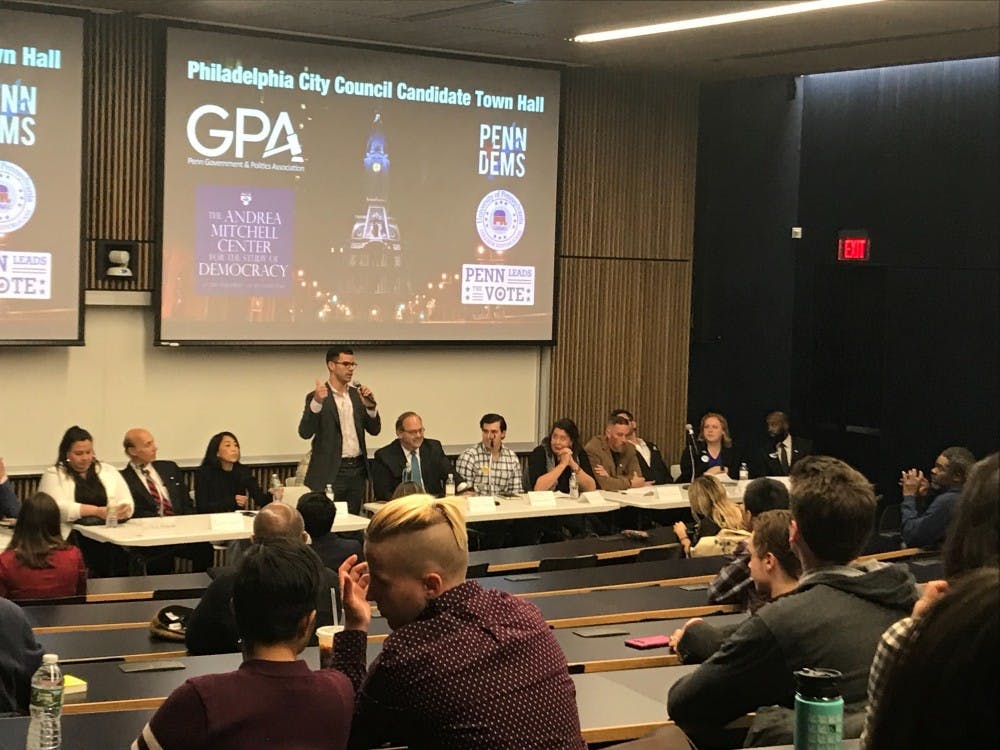At a Monday town hall hosted on Penn’s campus, 16 candidates for Philadelphia City Council debated various issues, ranging from the city’s efforts to combat the opioid epidemic, raise tax dollars, and form immigration policy.
The candidates at the town hall, co-hosted by the Penn Government and Politics Association (GPA), Penn Democrats, and College Republicans, included Democrats, Republicans, and independents. Housed in the Perelman Center for Political Science and Economics auditorium, around two dozen students were in attendance to hear from the candidates.
The City Council has seven at-large members and a further ten members who represent individual districts. The primaries for city council take place in just under two months on May 21, with 41 candidates vying for at-large seats. Penn is represented in District 3, where two candidates are contesting the election.
Two Penn-affiliated at-large candidates — Republican Matt Wolfe and Democrat Adrian Rivera-Reyes — sparred over whether Philadelphia should allow safe-injection sites, which are locations where individuals with drug addictions can access safe needles.
Wolfe, a 1978 College Graduate, came out strongly against such sites, citing the illegality of such initiatives under federal law. This February, federal prosecutors sued Philadelphia to stop them from establishing sites where drugs like heroin and fentanyl could be administered.
“It is a bad policy. It doesn’t give people the treatment that they need,” Wolfe said. “We need to focus on education and prevention treatment and help people recover, not allow them to put poison in their veins.”
Penn researcher Adrian Rivera-Reyes disagreed, claiming that such sites provided the opportunity to access treatment and therapy.
“This is not about what we believe or we don’t believe,” Rivera-Reyes said. “This is science, this is facts, this is data. We need safe injection sites and I support them."
The candidates touted a wide array of experiences and backgrounds that they claimed set each other apart from the field. Irina Goldstein, a Republican candidate, emphasized her status as an outsider.
“What makes me different is that I’m not a politician,” Goldstein said. “I’m a small business owner.”
Others discussed their backgrounds and how their experiences as part of marginalized groups affected them. Erika Almiron, a Democrat, cited her background as a daughter of immigrants and her work fighting for immigration rights.
“I know how to fight for the people,” Almiron said. “It was under my leadership at Juntos [an immigration rights organization in South Philadelphia] that we won the sanctuary city policy here in Philadelphia.”
The sanctuary city case referenced by Almiron refers to a recent ruling by a federal court declaring that the federal government could not cut off funding to Philadelphia over its sanctuary city policy, which protects immigrants without documentation from federal immigration authorities.
Many of the Democratic candidates promoted progressive policies to alleviate poverty, such as raising the minimum wage to $15 per hour, and implementing a local version of the Green New Deal.
An argument over the city's 1.5 cents per ounce tax on soda sparked fierce debate. Most Republicans on the panel, as well as several of the Democrats, came out in favor of eliminating it.
“I think we know who the Republicans on the panel are,” incumbent Democratic council-member and 1993 College graduate Helen Gym quipped, arguing in favor of the tax and claiming it provides a critical source of revenue for funding universal Pre-Kindergarten and other initiatives.









